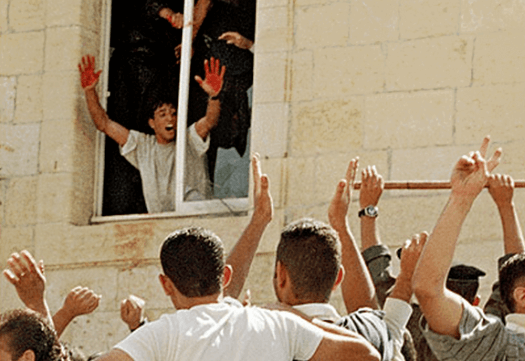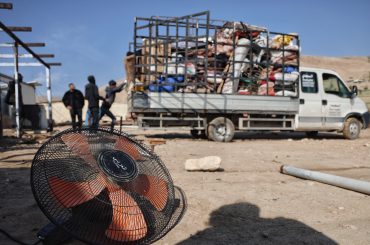
As I have written and spoken about what is happening in Gaza over the last month, a number of people have criticized me by saying that I am taking a one-sided position on Israel and Palestine and that I am not acknowledging Palestinian violence. I have seen the same criticism leveled at many others and therefore want to address this issue.
Everyone who has been involved in activism on this issue for an extended period of time has a particular moment that committed him or her to long-term activism. For me that moment was when two Israeli soldiers were killed in Ramallah in October 2000.
I was on my way to catch a taxi to Jerusalem when the two soldiers were brought to the police station in Ramallah, which was located next to the taxi station. I stood outside the police station for the better part of an hour as a crowd gathered after people heard rumors that two undercover Israeli soldiers had been captured while on their way to assassinate someone during a funeral that was to be held later that day. It turned out that the men were not undercover, but this was not an unreasonable rumor given the situation and history.
As policemen started to ring the walls surrounding the police station, I walked over to the taxi station to catch a ride to Jerusalem. As my taxi left the taxi station someone stopped it and yelled that the soldiers had been killed. I jumped out of the taxi at the Ramallah vegetable market and began making my way across Al-Manara (the central square in Ramallah) and towards the Bir Zeit taxis that would bring me home. As I crossed Al-Manara a group of young men came into the square dragging the bodies of the two soldiers. One of these men grabbed me by the throat and threatened me as others kicked and brutalized the soldiers’ bodies. I was able to convince the man assaulting me to let me go and then made my way home. Hours later I watched as Israeli Apache Helicopters bombed the Ramallah Police Station.
This was a transformational moment for me. It was my first experience with brutal violence and anger. Coming from a privileged and sheltered background, I could not comprehend how such extreme violence could manifest itself so quickly. Before this I had seen people shot from a distance, but seeing someone you don’t know get shot from a distance is a surprisingly impersonal experience. The personal nature of the soldiers’ killing completely unsettled me, pushing me outside of my comfortable reality. It caused me to begin asking a host of questions about what I was witnessing, about human nature, and about violence that I am still struggling to answer.
This was also the moment when I had to decide whether to stay and continue working on human rights issues or to leave. I chose to stay. The decision to stay exposed me to much more violence by both Palestinians and Israelis.
In May 2001 several car bombs were set off in West Jerusalem. One was set off on a road I normally walked down on my way to church. I heard that bomb explode when I was about two blocks from the bomb site. In early March 2002 a Palestinian accused of collaboration with Israel was hung upside down in the center of Al-Manara and had his throat slit. This was during an Israeli incursion. My work colleague and I grabbed a camera and made our way to scene of the killing through streets occupied by Palestinian gunmen. The body had been taken down before we arrived but blood still stained the ground. Less than a week later, as I returned from Church, a Palestinian suicide bomber blew himself up next to a bus in the French Hill Intersection in Jerusalem approximately 30 seconds before my taxi drove through the intersection. In another instance Palestinian gunmen shot two men accused of collaborating with Israel in the street in front of the restaurant where I was eating lunch. All of this left me with a clear understanding of Palestinian violence and some of the fear that Israelis feel.
However, during this same period I also saw incredible violence committed by Israelis. I saw people shot at demonstrations. I investigated executions in the West Bank towns of Beit Rima, Beni Naim and other locations. I arrived at the scene of one execution while skull fragments, hair, and blood remained on the ground and walls at the execution site. I was in Ramallah throughout Operation Defensive Shield and was walked around my home with a gun held against the back of my neck, cowered on my bathroom floor as an armored personnel carrier shot up my neighbor’s home, received calls from a woman throughout one night as her diabetic mother slowly died due to a lack of medication and blocked medical access, and searched for my colleague who disappeared from our offices when it was raided by Israeli soldiers. I saw Palestinians at checkpoints with boot prints visible on their faces, a sign that Israeli soldiers had stood on their heads. I watched soldiers humiliate parents in front of their children and children assaulted and terrified by these same soldiers.
Most importantly, for nearly three years the first thing I did every morning at work was read through the field reports and information that had come in the previous day regarding killings and injuries. I carefully read reports detailing the circumstances of death for nearly every Palestinian killed during the Second Intifada as well as reports about how many others were injured. I visited the families of those killed and participated in field investigations into the killings. I also read reports on nearly every act of Palestinian violence, whether carried out against other Palestinians or against Israelis.
Eventually the violence began to blend together. Individual acts of violence lost their meaning. This is not to say that they are insignificant for the Palestinians and Israelis impacted by the violence, but for me acts of violence stopped defining the conflict. It gradually became apparent that current acts of physical violence cannot be divorced from the history of the conflict, which is a history of colonialism and Palestinian dispossession. Equally, it became apparent that the acts of physical violence that I have witnessed cannot be divorced from the much more pernicious legal and structural violence that defines Israel’s occupation and its ethno- chauvinistic and discriminatory policies.
In short, it is my opinion that Israeli violence is the violence that must be exercised to maintain a neo-colonial military occupation and apartheid-like inequality. Palestinian violence is the inevitable response to that occupation and apartheid-like inequality. Violence therefore will only end when the occupation and Israeli apartheid end.
This also means that the situation is not one where violence can be balanced against violence. The power dynamics of the conflict are such that there is no balance. Both sides have harmed the other, but the overall power in Palestine and Israel rests with Israel, and its denial of Palestinian rights is at the core of the conflict.
As a firm believer in non-violence I will continue to actively work for an end to violence by all parties and for a long term transformation that results in a just peace, but that transformation cannot be realized if the actual power dynamics within the conflict and historic injustices are not acknowledged, understood, and addressed.
The truth is that it is not a history of Palestinian actions against Israelis that drives the conflict but rather the history of unresolved colonial dispossession of Palestinians and the continued denial of their rights that drives the conflict.
The history of Palestinian dispossession, the reality of occupation, and the reality of legal and structural inequalities are what I will continue to speak about and work to end, not individual acts of violence, recognizing that individual acts of violence will only end when larger changes are realized. To many this may appear unbalanced, but in Palestine and Israeli there is no reality of balance.
Merryman-Lotze first posted this piece on his Facebook page, where it gained great praise. He wishes to make clear that these are his views and not those of the organization that he works for.


I will worry about Palestine violence if they are ever as well weaponized as Israel and have something besides toy rockets and suiciding themselves to fight Israel with.
I think it’s fine, or even important, to acknowledge and caution Palestinians against violence. Tactically they cannot militarily win against the State, and there is also a Quaker ethical pacifist teaching against violence that is at least debatable. Granted, in terms of tactics, perhaps one may imagine that even if one loses each battle, one can still wear down another force by sustained fighting. But in any case, should you choose to take a pacifist view, it is sound, particularly in this case. The belief that the conflict can be overcome through nonviolent means is for me a much more attractive one.
The main problem would be if one not only acknowledged the problems of Palestinian violence, but then used it to justify crimes and abuses used against Palestinians, or saw Palestinian society as inherently and chiefly responsible, when in fact Palestinians and Israelis were able to get along before the 1947 Partition and 1948 war.
Your concluding three paragraphs were good.
But let us not say ‘In invasion or conquest you can do no right, in resistance you can do no wrong’. It is obviously natural for those subject to oppression and cruelty just to lash out but I suppose, facile as it seems for us at comfortable distance, we have to ask them to set limits.
Well said.
I would add that violence MUST end once two secular and democratic states of and for their respective citizens, immigrants, ex-pats and refugees have emerged and been encouraged to flourish.